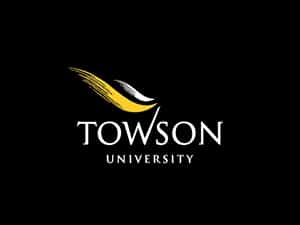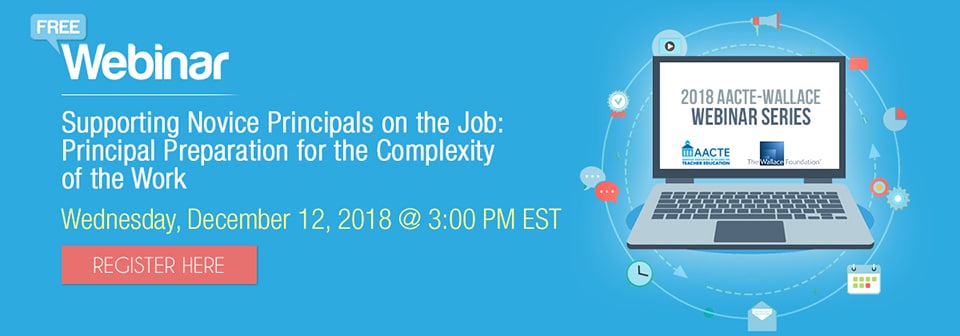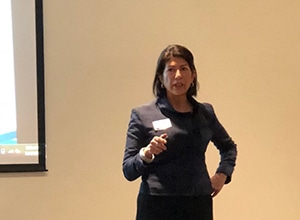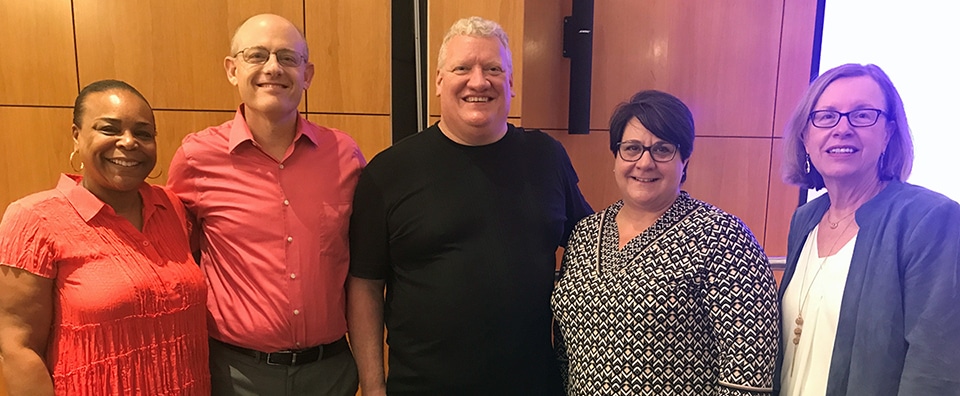11 Dec2018
By Jeff Rea
This article originally appeared on oswego.edu and is reprinted with permission from the SUNY Oswego Office of Communications & Marketing.
The SUNY Oswego School of Education has joined three other educator-preparation schools in Bank Street College’s Prepared to Teach-New York Learning Network, an initiative designed to develop sustainable funding pathways for residency programs that embed teacher candidates in schools and communities for two full semesters.
Prepared to Teach-NY, recipient of a $500,000 grant from Carnegie Corporation of New York, cites evidence to support a sea change in what represents "student teaching" in the state. The new model takes a page from residencies in medical professions for deeper, richer, authentic experiences linking school placements to concurrent education coursework.
11 Dec2018
By Meghan Grenda

In July 2018, AACTE and the National Association of Community College Teacher Education Programs (NACCTEP) entered into an 18-month pilot partnership program to foster collaboration through the common goals of advocating for, advancing, and diversifying educator preparation programs. Since then, the partnership has grown with community colleges from seven states: California, Oregon, Maryland, Arizona, Colorado, Minnesota, and Texas. If you are part of a community college educator preparation program interested in connecting with 4-year degree-granting institutions, then you can join the partnership too!
The partnership helps strengthen the teacher pipeline, bring diversity to the field, and advance the preparation of educators. In addition to receiving NACCTEP benefits, all partners receive AACTE benefits, including the following:
06 Dec2018
By Anne Marie Fenton
The profession of education is highly complex, with educators having to make multiple decisions in their daily work. Competing tensions and multiple, greatly nuanced variables that are inherent in this field can add to the vulnerabilities and risks that educators must navigate, especially when it comes to professional decision making.
To gauge attitudes regarding teacher educators’ beliefs about the role of preparing candidates to navigate these complexities through preparation in educator ethics, current practices, and what resources might be most useful for enhancing professional ethics preparation, AACTE is collaborating with the National Association of State Directors of Teacher Education and Certification (NASDTEC), and the National Council for the Advancement of Educator Ethics (NCAEE) to conduct a brief survey.
05 Dec2018
By Jon Clausen, Chrystalla Mouza, Elizabeth Langran and David Slykhuis
Members of AACTE’s Committee on Innovation and Technology at the 2018 National Technology Leadership Summit in Washington, DC (L to R Shaunna BuShell, Guy Trainin, Jon Clausen, Lara Luetkehans, and Arlene Borthwick)
At the AACTE 71st Annual Meeting in Louisville, Kentucky, the AACTE Committee on Innovation and Technology (I&T) will host a free preconference symposium Thursday, February 21, on “Action Steps to Address the Challenge of Integrating Technology in Teacher Preparation.” Members of the AACTE Committee, leaders from the Office of Educational Technology at the U.S. Department of Education, and representatives from accreditation and standards organizations will share strategies, exemplars, and tools for education leaders to make informed decisions, develop processes, and assess the impact of their efforts to infuse technology throughout educator preparation programs. Participants will focus on four themes related to action steps education leaders can take to address the challenge of technology integration throughout teacher education. These include
04 Dec2018
By Katrina Norfleet

When it comes to teacher education, how can you distinguish problems, which can be solved, from dilemmas, which can only be managed? This question is the featured discussion of the Journal of Teacher Education article published in the Sept/Oct 2018 issue, Marching Forward, Marching in Circles: A History of Problems and Dilemmas in Teacher Preparation, authored by Jack Schneider, assistant professor of education, College of the Holy Cross.
In a recent podcast interview for JTE Insider blog, Schneider offers insights on the article during his chat with podcast host JTE graduate assistant Mary Neville. “It’s kind of a funny piece in that it tries to come up with a number of typologies for the history of teacher education,” said Schneider. During the interview, Schneider identifies four contextual factors, three core dilemmas and four periods of history of teacher education.
04 Dec2018
By Jerrica Thurman

In Fall 2017, AACTE member institution Towson University’s College of Education launched a pilot program, SIMTeach@TU, to strengthen its clinical and practice-based curriculum through virtual simulation. The program features eight faculty who develop problem-based case scenarios for teacher candidates to experience real-world human interactions with avatars via the virtual reality technology called Mursion. The training simulations recreate the most demanding interpersonal challenges that teacher candidates may confront in the classroom with PK-12 students. It allows preservice teachers to practice and master the complex interpersonal skills necessary to be effective in difficult situations.
“We see simulation—or approximations of practice—work as part of the trajectory of getting our preservice teachers ready to work with real students in classrooms,” said Laila Richman, associate dean of the College of Education at Towson. “We think about this as the first phase of a university-based clinical curriculum that moves them towards being able to work with students.”
04 Dec2018
By Donna Cooner and Wendy Fothergill

Strong leadership is a necessary catalyst for student learning, yet the complexity of the work makes it sometimes hard to focus on the role of instructional leader. AACTE will host a free webinar, Supporting Novice Principals on the Job: Principal Preparation for the Complexity of the Work on Wednesday, December 12, from 3:00-4:00 p.m. EST. Please tune in to attend the webinar, part of a series on principal leadership sponsored by The Wallace Foundation.
Topics will include
30 Nov2018
By Carlos Richardson

Congratulations to Kayla C. Elliott, Holmes Scholar of the Month for November 2018!
Elliott attends Florida Atlantic University (FAU) College of Education where she is pursuing a Ph.D. in higher education leadership. Elliott’s dissertation topic is The Influence of performance based funding on power and relationships at Historically Black Colleges and Universities. Her research interests include higher education equity, higher education leadership, higher education policy, historically black colleges and universities, minority serving institutions, and more.
28 Nov2018
By Jerrica Thurman

Check out the initial lineup of sessions and presenters for the 2019 Annual Meeting, now available through the online AACTE Event Planner!
Once you have logged in, sort through the hundreds of sessions to attend by searching titles, descriptions, presenter names, locations, and other fields. And new this year, you can now select strands and interest areas to narrow down your options as well.
27 Nov2018
By Caitlin Wilson

AACTE invites you to view a livestreamed panel discussion on preliminary findings from The Wallace Foundation’s University Principal Preparation Initiative (UPPI) at 10:30-11:30 a.m. on Wednesday, December 12, 2018. Register here.
Many district and university leaders agree that most university-based programs do not prepare principals to reflect the real-world demands of the job according to a 2016 survey. Consequently, seven universities participating in the Wallace initiative set out to redesign their programs to be more effective. A 2018 independent study by the RAND Corporation, Launching a Redesign of University Principal Preparation Programs, now suggests that the universities’ complex redesign efforts are beginning to pay off—through comprehensive, interdependent partnerships with local districts and the state.
21 Nov2018
By Lynn M. Gangone and Renée A. Middleton
These letters to the editor, Don’t Blame Admissions Standards and Ed. Colleges Provide Value first appeared in Education Week on November 13, 2018. Reprinted with permission from the authors.
Don’t Blame Admissions Standards
To the Editor:
Marc Tucker has helped us better understand education systems around the world. Unfortunately, in his recent opinion blog post (“Teachers Colleges: The Weakest Link,” November 1, 2018), he demonstrates less understanding of America’s teacher-preparation programs than he has about programs abroad.
19 Nov2018
By Deborah Koolbeck

With the election over, Congress returns to Washington, D.C. to wrap up the year—and for some members, their time in Washington. As the U.S. House of Representatives and U.S. Senate start the lame-duck session, some attention is turning to the 116th Congress that begins in January.
With Congress finishing the Labor, Health & Human Services, Education and Related Agencies appropriations bill on time (September 30), it is important to remember that a large portion of the federal government is operating under a Continuing Resolution (CR). With a deadline of December 7, the CR brings with it contention and the potential for a government shutdown. It is also unclear what else the Republican majority will want to do in the last weeks of its leadership in the House and what the Senate can get done as well.
19 Nov2018
By Jerrica Thurman

The draft of the AACTE 2019-2022 strategic plan is now available for members–only review. You can access the plan on the AACTE strategic planning web page.
The draft plan is a two-page document, which consists of the following sections:
16 Nov2018
By Jerrica Thurman

The 2019 AACTE Annual Meeting is just 12 weeks away! As you prepare for your stay in Louisville, Matt Wales, AACTE vice president, membership, events and special projects, offers some helpful tips to help you make the most of your time at the conference and in the host city:
What features of the Kentucky International Convention Center (KICC) make it a great host location for the AACTE Annual Meeting?
The KICC is truly a state-of-the-art facility. The KICC was closed in 2016, to undergo two years of construction enhancement and renovation. Having just reopened in August 2018, AACTE attendees will experience our General Sessions and Deeper Dives in a brand new, 40,000-square-foot ballroom that allows us to accommodate more seating, more space for networking, and additional, technological capacity for increased interactivity during these AACTE sessions.
16 Nov2018
By Katrina Norfleet

AACTE President and CEO Lynn M. Gangone recently traveled to Indiana where she met with deans of colleges and schools of education throughout the state, and representatives from the State Department of Education and national foundations to discuss educator preparation from a national perspective. Gangone also was invited to be the lead speaker at the Indiana Association of Colleges for Teacher Education’s (INACTE’s) first statewide summit, and presented data from the Colleges of Education: A National Portrait report.
Ena Shelley, an AACTE board member and INACTE member, shared how important it was to hear the trend data. “When you are working within state borders, you think it is just your state, but when you see the trend data—how long teachers are staying or not staying, the demographics—it makes it real,” Shelley said. “I think the report was so important because we really haven’t had a succinct, cohesive report like the National Portrait, which gives us real data to look at … [and ask ourselves] now what can we do about it?”













